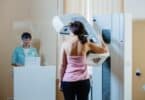Although anyone can develop Alzheimer’s, women are disproportionately more likely to be diagnosed with this heartbreakingly degenerative condition. In fact, statistics indicate that women are two-thirds more likely to develop Alzheimer’s than men. Researchers from Cornell University say that the loss of estrogen among menopausal women could be at least partially to blame.
“Our findings show that the loss of estrogen in menopause doesn’t just diminish fertility. It also means the key loss of neuroprotective element in the female brain and a higher vulnerability to brain aging and Alzheimer’s disease,” Dr. Lisa Mosconi, the lead researcher on the study, said in the PLoS One medical journal publication. “We urgently need to address these problems because, currently, 850 million women worldwide are entering or have entered menopause.”
Mosconi and her team became concerned about the link between Alzheimer’s and menopause after examining the positron emission tomography imaging technology results of 43 women. Aged 40 to 60, 15 of the female participants were premenopausal, 14 were perimenopausal (transitioning to menopause), and 14 were postmenopausal.
Postmenopausal and perimenopausal women were found to have lower glucose metabolism levels than premenopausal women. Researchers believe this may be at least relatively important in the risk of Alzheimer’s in women. Furthermore, researchers found signs of a mitochondrial dysfunction, an issue in which the brain does not process energy as efficiently as it should. Findings also indicated that a metabolic enzyme, “mitochondrial cytochrome oxidase,” was less abundant in perimenopausal and postmenopausal women. These women also scored significantly lower in memory tests.
“Our studies demonstrate . . . that women need medical attention in their 40s, well in advance of any endocrine or neurological symptoms,” Dr. Mosconi said. She added that there may be a “critical window of opportunity when women are in their 40s and 50s, to detect metabolic signs of higher Alzheimer’s risk and apply strategies to reduce that risk.”
Antioxidants, particularly those found in natural food sources, could help, Mosconi says. However, more research must be done to determine if this, or other menopause treatments, such as hormone replacement therapy, may be effective at reducing a woman’s risk of developing Alzheimer’s during or after menopause.







